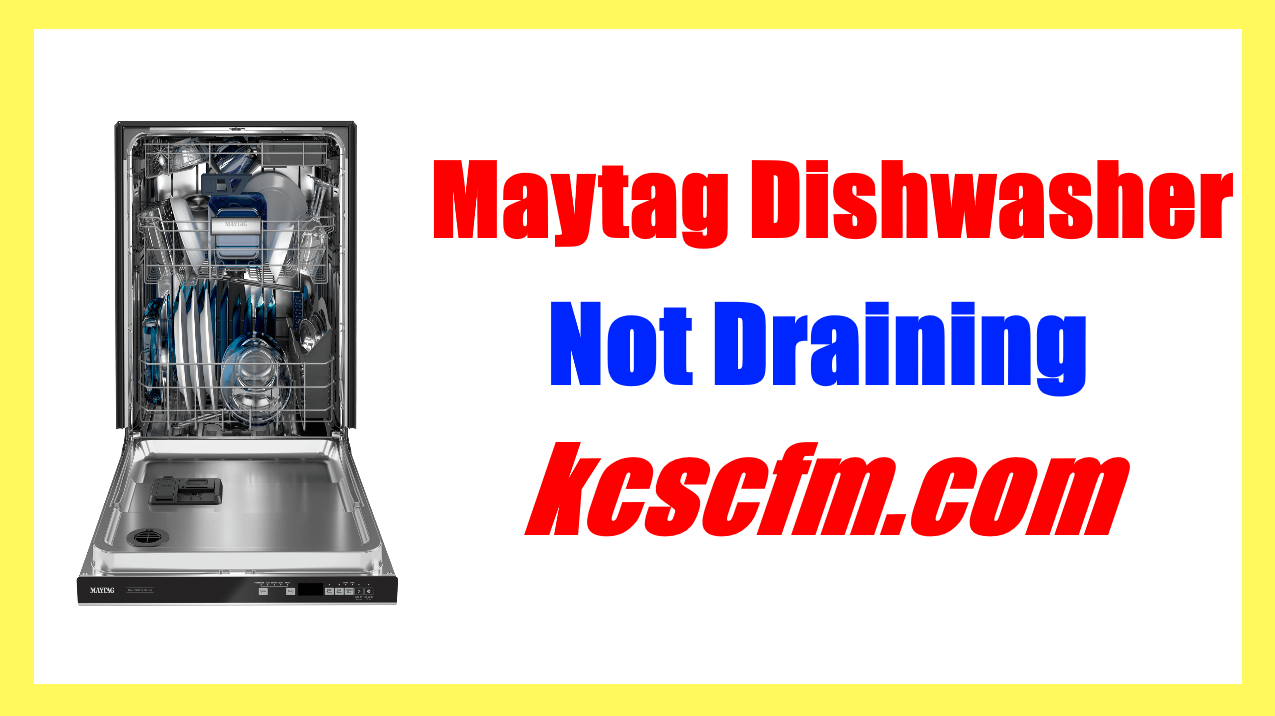The Maytag dishwasher is a great appliance to have in your kitchen. It can get the dishes clean and dry them all at once, saving you time that would otherwise be spent scrubbing or waiting for dishes to dry. However, there are times when Maytag dishwashers will not drain properly, and water will back up into the sink instead of going down into the waste line. This is a problem that doesn’t happen often, but it’s still important to know how to fix it if it does occur.
A Maytag dishwasher not draining can be an issue for many homes. The appliance may need a simple fix, or it could be a sign of a larger problem. Here are some potential solutions to help with this frustrating situation.
The blog post goes into detail about troubleshooting and fixing a Maytag dishwasher that does not drain properly.
What Causes Maytag Dishwasher Not Draining? Troubleshooting and Diagnosis

If you are experiencing a problem with your Maytag dishwasher that won’t drain, there may be an easy fix! Follow this guide to diagnose the issue and get back on track.
Check Drain Hose
The Maytag dishwasher not draining could be caused by the drain hose being kinked or crushed. If this is the issue, then manually unkinking it will solve most issues. However, there are also times when a Maytag dishwasher may have been installed incorrectly and needs to be moved away from any obstacles so that it can function properly.
A Maytag dishwasher that is not draining could be a sign of a clogged drain hose. This can happen if the kitchen sink has been used to rinse dishes and food particles have entered the pipe and when grease or food debris builds up inside it, such as from cooking bacon in it.
There are also times where lint may get lodged in there too, which can build up over time and cause Maytag dishwasher problems like this one. These cases usually require taking apart the Maytag’s plumbing system to clear out any blockages so that water can flow freely through them again.
Clogged Drain Filter
One Maytag dishwasher problem that can cause Maytag dishwasher not to drain is a clogged drain filter. If this becomes blocked and water cannot flow through it, the Maytag will be unable to rinse cleanly.
This happens when grease or food debris builds up inside it from cooking bacon in it, for example. The blockage needs to be cleaned out with hot water and an old toothbrush so that dishes are rinsed properly without any limescale residue left behind on them. This keeps the appliance running smoothly again as well as makes sure nothing is compromising its safety either by getting into contact with electrical parts or wiring insulation.
Most of the soil is washed away when you just run the filter under the sink faucet. Scrub-caked-on dirt/debris off with an old toothbrush, but don’t use anything made of tough material because that could damage it. After cleaning, replace the old filter with a new one. If your dishwasher has a grate or cage at the bottom, then make sure you put it back correctly.
Clogged Garbage Disposal
In most instances, the dishwasher drain hose connects to garbage disposal. When there is food built up inside the disposal or if it is clogged, there will be less room for water to flow in and out of the dishwasher.
To fix the problem of a dishwasher not draining, try running the disposer thoroughly with plenty of water flowing to clear it out.
Check Drain Pump
The drain pump uses an impeller to force water through the hose. If the motor is not working, your dishwasher won’t be able to get rid of any dirty dishes! To find out if it’s just a problem with this specific part or something else entirely, check for continuity in the type and power supply before you decide what needs replacing.
Drain pumps are single-use parts, so once they break down, there isn’t much that can be done other than swapping them out. So replace it if the drain pump is not working.
Clean the Air Gap
Air gaps act as a safety device to block water from draining back into the dishwasher. Maytag dishwashers are equipped with air gaps that should be cleaned regularly and inspected for clogs, corrosion, or debris build-up. If your Maytag is not fully draining after running it through its cycle, this could be the problem!
Use a towel to clean the Diswasher’s Air gap and pipe cleaners for any stubborn debris. You can also use an air compressor or simply blow through a cardboard tube.
Timer
The Maytag dishwasher’s timer can be set to delay the drain pump from turning off. This setting is not applicable for all Maytag models, so check your manual before applying this fix. If you have a Maytag dishwasher acting up and draining slowly, try switching the time delay on or off.
A mechanical timer is used to control dishwasher cycles on many models. The timer can be found at the top of your dishwasher’s front panel, typically near the door. The timer can then be checked with a multi-meter to ensure it is not defective. Replace the timer if it fails the continuity test.
Using the Wrong Type of Detergent
Maytag dishwashers will not drain if the wrong type of detergent is used. Maytag recommends using powder fillers and tablets for use in their machine. If you are thinking about switching from liquid to powder or vice versa, be sure that all the other settings remain unchanged.
Accidentally using dish soap in your dishwasher will cause the machine to produce an excess of suds, which in turn will interfere with a drain. The best way to fix this problem is to wipe down your dishwasher and removing any detergent residue from the tray. In addition, try running your dishwasher empty with just a dash of detergent.
Stuck Check Valve
The check valve helps to ensure the wash water doesn’t recirculate back into your dishwasher. If the valve malfunctions and gets stuck in the open position, it will cause water to flow back into and fill the dishwasher.
When this happens, you will usually be able to see some water left in the dishwasher since most of it would have been pumped out. Your dishes may be contaminated because of the backflow.
The check valve may be clogged, in which case you can try to remove it and clean it or replace the entire pipe. A blockage could also mean that something is broken internally; either way, contact a professional to diagnose and fix the problem.
I hope this article was helpful in explaining the problem and how to fix it. If you need any help, let me know in the comments below.

Hi there! I’m Sam Hendricks, and I’m a repair technician and expert. I created this website to help people like you save money and time by fixing your own appliances.
Over the years, I’ve seen people spend a lot of money on unnecessary repairs or replacements. That’s why I decided to share my expertise and create easy-to-follow guides for fixing appliances on your own.
